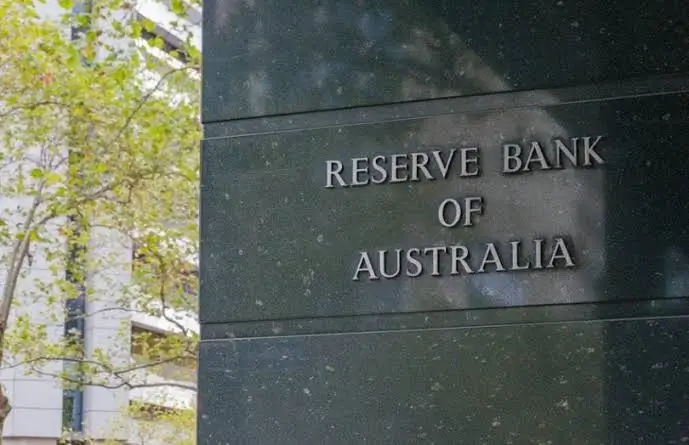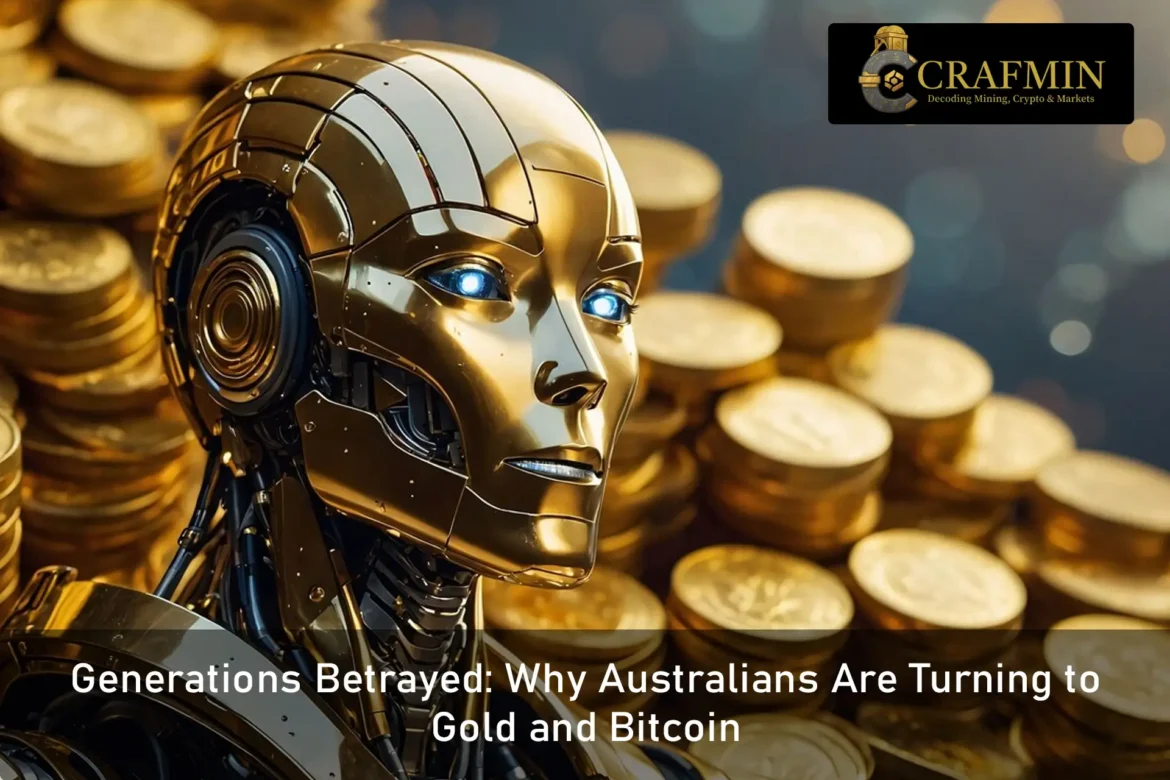In living rooms, cafés, and office spaces across Australia, people are quietly rethinking how they protect their money. It’s not a flashy movement. There are no banners or fiery speeches. Instead, there’s a steady and thoughtful shift—one that tells a bigger story about lost confidence, hard-earned lessons, and a yearning for something more secure.
As inflation bites and economic decisions feel further from everyday control, Australians are leaning into assets that promise safety and autonomy: gold and bitcoin.

Australians Turn to Gold and Bitcoin for Security (Image Source: Crypto News Australia)
The Cracks in the Foundation: Trust in Fiat Money Fades
For generations, fiat currencies like the Australian dollar and the US dollar were trusted without question. Backed by central banks and embedded in every part of life, fiat money seemed unshakable. But over time, things have changed.
The dollar no longer stretches as it once did. Salaries don’t keep pace with living costs. Debt spirals. Australians are watching their purchasing power dwindle and beginning to question the very money they earn and save in.
It’s not just suspicion; it’s lived experience. And it’s pushing many to look for alternatives.
Gold: The Ancient Refuge in Modern Times
For thousands of years, gold has stood as a symbol of permanence. Through empires, collapses, wars, and recessions, gold has held its ground. Today, amid rising financial uncertainty, Australians are returning to this age-old protector.

Gold: Timeless Refuge in Uncertain Times (Image Source: Vocal Media)
Gold is tangible. You can see it, hold it, store it. Unlike digital numbers on a banking app, gold carries intrinsic value recognised across the globe. More than just a hedge against inflation, it offers psychological comfort—a reassurance that wealth stored in gold won’t vanish overnight due to political decisions or market crashes.
In a world where many feel increasingly powerless, gold gives people a measure of control.
Bitcoin: The Brave New Standard
Then there’s bitcoin—the digital counterweight to gold’s tradition. Born from the ashes of the 2008 financial crisis, bitcoin represents rebellion, innovation, and independence. It doesn’t rely on banks. It doesn’t ask for permission. And it can’t be inflated by printing more.
Younger Australians, who’ve grown up during recessions and housing bubbles, see bitcoin not as a gamble but as a genuine store of value. It’s borderless, decentralised, and built on a technology that promotes transparency and accountability.
What gold is to older generations, bitcoin is to the new.
Inflation: The Stealthy Saboteur
Inflation doesn’t make headlines in the way interest rate changes or political scandals do. But its impact is felt everywhere—from the checkout aisle to the petrol pump. Each year, the value of the dollar shrinks, and what used to be affordable becomes a luxury.
Australians are waking up to this reality. Savings that once promised security now erode quietly. Even conservative investment vehicles no longer guarantee peace of mind.
Inflation, once dismissed as a slow economic tide, is now viewed as a direct threat to individual wealth. That’s why many are ditching traditional savings in favour of assets that can withstand the pressure.
Central Banks: The Uneasy Guardians
Central banks like the Reserve Bank of Australia play a crucial role in economic stability. Their policies shape borrowing, inflation, and the broader economy. But with great power comes great scrutiny.
For some Australians, recent decisions—whether it’s record-low interest rates or massive stimulus packages—feel less like support and more like interference. There’s growing unease that centralised monetary policy may serve institutions before individuals.
That’s where the appeal of gold and bitcoin becomes more than financial—it becomes philosophical. These assets offer a break from systems many no longer trust.

Central Banks: Unsteady Hands of the Economy (Image Source: Medium)
A Growing Divide: Intergenerational Wealth Inequality
Walk through any major city, and you’ll see the signs—skyrocketing property prices, stagnant wages, and an ever-widening gap between generations. Boomers were able to buy homes, build savings, and retire with confidence. Millennials and Gen Z, however, are grappling with student debt, unstable job markets, and diminishing opportunities.
This gap isn’t just economic; it’s emotional. Many young Australians feel let down by a system that promised stability and delivered stress. And they’re not sitting quietly.
They’re looking for alternatives—and finding them in gold and bitcoin.
The Decentralised Appeal
There’s a quiet power in decentralisation. It strips away gatekeepers. It offers independence. It aligns with a growing desire to take back control of one’s financial future.
Bitcoin, in particular, embodies this vision. It doesn’t rely on central banks or governments. Transactions happen peer-to-peer. Ownership is direct and verifiable. It’s a stark contrast to traditional finance, where intermediaries dominate.
This appeal isn’t lost on Australians, especially those disenchanted with politics and institutions. Gold offers physical sovereignty. Bitcoin offers digital freedom. Together, they represent a new kind of empowerment.

Decentralised Power: Gold and Bitcoin (Image Source: StartupNews.fyi)
Why Gold and Bitcoin Work Well Together
Some see gold and bitcoin as rivals. In truth, they’re more like partners. Where gold offers long-standing security, bitcoin adds innovation and growth potential. Gold thrives in times of crisis. Bitcoin shines when systems falter.
Used together, they provide a balanced strategy. Gold tempers volatility. Bitcoin opens doors to future value. Australians seeking financial resilience are increasingly combining both to hedge against uncertainty.
Diversification isn’t just a buzzword—it’s a defence.
Preparing for What Lies Ahead
The world is changing. So is the economy. As digital currencies rise and traditional systems strain, the future feels uncertain—but not necessarily bleak.
Australians are adapting. They’re questioning old assumptions. They’re exploring new paths. Whether through buying gold coins, setting up bitcoin wallets, or simply learning more about decentralised finance, people are taking charge of their financial futures in ways we’ve never seen before.
This isn’t fear-based. It’s wisdom born from experience.
Conclusion: More Than Just a Trend
The move toward gold and bitcoin isn’t a fad. It’s not driven by hype or hysteria. It’s a response to deeper forces—rising inflation, distrust in fiat money, centralised policies, and generational imbalances.
Gold and bitcoin stand not just as investments but as symbols. They represent stability in chaos, freedom from control, and a future where everyday Australians can protect what they’ve worked hard to build.
In a world where traditional systems no longer offer the same assurance, people are forging their own paths. And whether it’s through the timeless glint of gold or the digital promise of bitcoin, one thing is clear:
Australians are done waiting for stability. They’re creating it.

